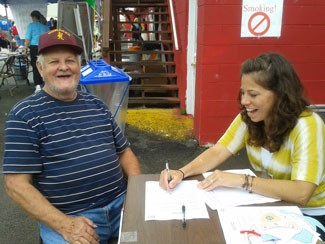Professor, Students See Rural Health-care Needs Firsthand

Nursing student Jessica Munnikhuysen shares a light moment with a questionnaire respondent.
Their needs were vast, and their resources were limited or didn't exist at all. Some stood in line all night in the hope of getting help.
That was the scene at the Wise County Remote Area Medical (RAM) fair. Radford University Nursing Professor Gini Weisz, accompanied by students Julia Cookson and Jessica Munnikhuysen, traveled to Wise to conduct a survey of patients at the event, held July 20-22 at the Wise County Fairgrounds.
RAM is an all-volunteer international organization of doctors, nurses, pilots, veterinarians and support workers who travel around the globe providing dental, vision and medical services to populations in need of relief. The Wise County fair drew more than 2,400 people, the majority coming for dental care.
Weisz, conducting her fourth study on the topic of rural health-care needs, leads a research team whose focus is to survey patients living in underserved rural areas. The trip to Wise was made possible through funding from a Radford University seed grant.
Also working with Weisz to gather data and analyze research results are alumnae Amanda Morgan and Cecile Dietrich, and graduate student Jerusalem Walker.
Weisz said the anonymous survey asked demographic questions such as whether the person responding had a regular health-care provider and transportation to a provider, as well as whether the person was employed and had insurance. There were also questions about smoking, alcohol and drug use.
Respondents then rated the helpfulness of a wide range of services being provided, from conventional (doctors, nurse practitioners, mental-health personnel, physical therapists) to complementary and alternative (chiropractors, herbalists, massage therapists, neighbors or friends).
Findings will not be released until later in the year, Weisz said, but a preliminary review indicates that often the sole source of health care for rural residents is a neighbor, family member or friend, registered nurse or licensed practical nurse.
"This was included in the questionnaire because that finding came out of focus groups I conducted for an earlier study," Weisz said. "The respondents also tended to have incomes less than $15,000 per year, and they or their family members were often uninsured."
Because many of the people surveyed did not have a regular provider for their health-care needs, they viewed the RAM fair as a blessing, Weisz said.
"One group of providers made dentures, while another provided glasses," Weisz said. "Some patients had minor surgical procedures performed, such as the removal of moles. Mammograms, bone densities, Pap smears and breast exams were also available."
Weisz said experiences such as the RAM project make nursing students more aware of the needs of other populations. Her students also enjoyed the research process and being involved with small projects like making colorful paper teapots with tea or coffee bags as gifts for those who completed the survey.
The students said they expanded their comfort with talking to people of all demographic and economic groups and enjoyed hearing their stories.